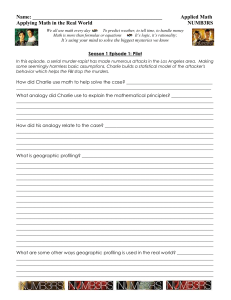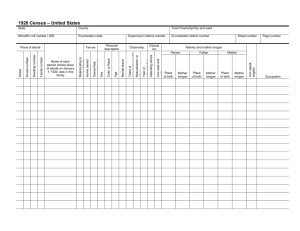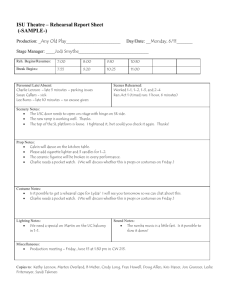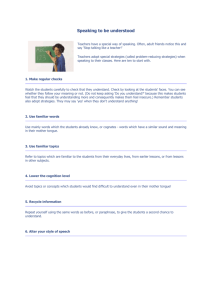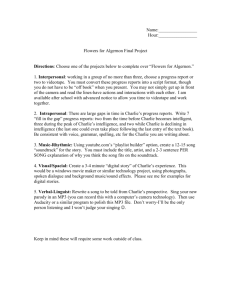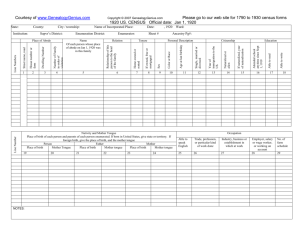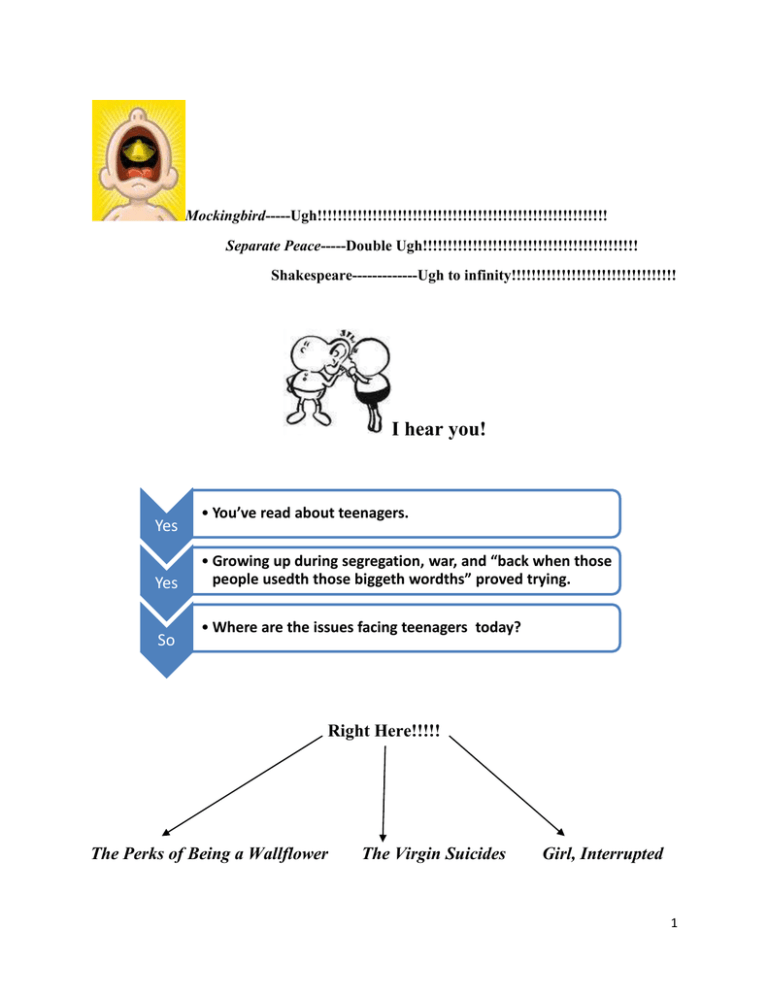
Mockingbird-----Ugh!!!!!!!!!!!!!!!!!!!!!!!!!!!!!!!!!!!!!!!!!!!!!!!!!!!!!!!!!!
Separate Peace-----Double Ugh!!!!!!!!!!!!!!!!!!!!!!!!!!!!!!!!!!!!!!!!!!!
Shakespeare-------------Ugh to infinity!!!!!!!!!!!!!!!!!!!!!!!!!!!!!!!!!
I hear you!
Yes
Yes
So
• You’ve read about teenagers.
• Growing up during segregation, war, and “back when those
people usedth those biggeth wordths” proved trying.
• Where are the issues facing teenagers today?
Right Here!!!!!
The Perks of Being a Wallflower
The Virgin Suicides
Girl, Interrupted
1
The Coming-of-Age -- In Contemporary Literature
A coming-of-age story or novel is memorable because the character undergoes adventures and/or inner
turmoil in his/her growth and development as a human being. Some characters come to grips with the
reality of cruelty in the world--with war, violence, death, racism, and hatred--while others deal with
family, friends, or community issues.
It is a type of novel where the protagonist is initiated into adulthood through knowledge, experience, or
both, often by a process of disillusionment. Understanding comes after the dropping of preconceptions, a
destruction of a false sense of security, or in some way the loss of innocence. Some of the shifts that take
place are these:
ignorance to knowledge
innocence to experience
false view of world to correct view
idealism to realism
immature responses to mature responses
_________________________________________________________________________________
During this 9 weeks, we will read and discuss 3 works of contemporary fiction that deal with issues
facing today’s adolescents---that’s you. Some of the subjects will include:
Depression
Family
Relationships
Self Image/Self Esteem
Stress
Drug/Alcohol Use
2
Each Friday, we will discuss the assigned reading in an open forum.
You will grade yourself using the discussion rubric provided.
You will keep a personal diary for the duration of the class following the provided guidelines.
At the end of the quarter, you will submit your diary (will be returned) and your discussion
rubric. If you have kept up with your diary and discussed on a regular basis, you Pass.
The Perks of Being a Wallflower Stephen Chbosky
224 pages
Who are those lanky, sad-eyed boys hovering around the edges of parties? This epistolary novel spotlights
the world of the brilliant but troubled Charlie, who chronicles his freshman year in a Pennsylvania high
school.
What is most notable about this funny, touching, memorable first novel from Stephen Chbosky is the
resounding accuracy with which the author captures the voice of a boy teetering on the brink of
adulthood. Charlie is a freshman. And while's he's not the biggest geek in the school, he is by no means
popular. He's a wallflower--shy and introspective, and intelligent beyond his years, if not very savvy in
the social arts. We learn about Charlie through the letters he writes to someone of undisclosed name, age,
and gender, a stylistic technique that adds to the heart-wrenching earnestness saturating this teen's story.
Charlie encounters the same struggles that many kids face in high school--how to make friends, the
intensity of a crush, family tensions, a first relationship, exploring sexuality, experimenting with drugs-but he must also deal with his best friend's recent suicide. Charlie's letters take on the intimate feel of a
journal as he shares his day-to-day thoughts and feelings.
With the help of a teacher who recognizes his wisdom and intuition, and his two friends, seniors
Samantha and Patrick, Charlie mostly manages to avoid the depression he feels creeping up like kudzu.
3
When it all becomes too much, after a shocking realization about his beloved late Aunt Helen, Charlie
retreats from reality for awhile. But he makes it back in due time, ready to face his sophomore year and
all that it may bring. Charlie, sincerely searching for that feeling of "being infinite," is a kindred spirit to
the generation that's been slapped with the label X.
This is the story of what it's like to grow up in high school. More intimate than a diary, Charlie's letters
are singular and unique, hilarious and devastating. We may not know where he lives. We may not know
to whom he is writing. All we know is the world he shares. Caught between trying to live his life and
trying to run from it puts him on a strange course through uncharted territory. The world of first dates and
mixed tapes, family dramas and new friends. The world of sex, drugs, and The Rocky Horror Picture
Show, when all one requires is that perfect song on that perfect drive to feel infinite.
Through Charlie, Stephen Chbosky has created a deeply affecting coming-of-age story, a powerful novel
that will spirit you back to those wild and poignant roller coaster days known as growing up.
Excerpt. © Reprinted by permission. All rights
reserved.
From Part One
"Boys and girls, I regret to inform you that one of our
students has passed on. We will hold a memorial
service for Michael Dobson during assembly this
Friday."
August 25, 1991
Dear friend,
I am writing to you because she said you listen and
understand and didn't try to sleep with that person at
that party even though you could have. Please don't
try to figure out who she is because then you might
figure out who I am, and I really don't want you to do
that. I will call people by different names or generic
names because I don't want you to find me. I didn't
enclose a return address for the same reason. I mean
nothing bad by this. Honest.
I just need to know that someone out there listens and
understands and doesn't try to sleep with people even
if they could have. I need to know that these people
exist.
I think you of all people would understand that
because I think you of all people are alive and
appreciate what that means. At least I hope you do
because other people look to you for strength and
friendship and it's that simple. At least that's what I've
heard.
So, this is my life. And I want you to know that I am
both happy and sad and I'm still trying to figure out
how that could be.
I try to think of my family as a reason for me being
this way, especially after my friend Michael stopped
going to school one day last spring and we heard Mr.
Vaughn's voice on the loudspeaker.
I don't know how news travels around school and
why it is very often right. Maybe it was in the
lunchroom. It's hard to remember. But Dave with the
awkward glasses told us that Michael killed himself.
His mom played bridge with one of Michael's
neighbors and they heard the gunshot.
I don't really remember much of what happened after
that except that my older brother came to Mr.
Vaughn's office in my middle school and told me to
stop crying. Then, he put his arm on my shoulder and
told me to get it out of my system before Dad came
home. We then went to eat french fries at
McDonald's and he taught me how to play pinball.
He even made a joke that because of me he got to
skip an afternoon of school and asked me if I wanted
to help him work on his Camaro. I guess I was pretty
messy because he never let me work on his Camaro
before.
At the guidance counselor sessions, they asked the
few of us who actually liked Michael to say a few
words. I think they were afraid that some of us would
try to kill ourselves or something because they
looked very tense and one of them kept touching his
beard.
Bridget who is crazy said that sometimes she thought
about suicide when commercials come on during TV.
She was sincere and this puzzled the guidance
counselors. Carl who is nice to everyone said that he
felt very sad, but could never kill himself because it
is a sin.
4
This one guidance counselor went through the whole
group and finally came to me.
My dad said, "There are other people who have it a
lot worse."
"What do you think, Charlie?"
And my mom was quiet. And that was that. A month
later, my sister met another boy and started playing
happy records again. And my dad kept working. And
my mom kept sweeping. And my brother kept fixing
his Camaro. That is, until he left for college at the
beginning of the summer. He's playing football for
Penn State but he needed the summer to get his
grades right to play football.
What was so strange about this was the fact that I had
never met this man because he was a "specialist" and
he knew my name even though I wasn't wearing a
name tag like they do in open house.
"Well, I think that Michael was a nice guy and I don't
understand why he did it. As much as I feel sad, I
think that not knowing is what really bothers me."
I just reread that and it doesn't sound like how I talk.
Especially in that office because I was crying still. I
never did stop crying.
The counselor said that he suspected that Michael
had "problems at home" and didn't feel like he had
anyone to talk to. That's maybe why he felt all alone
and killed himself.
Then, I started screaming at the guidance counselor
that Michael could have talked to me. And I started
crying even harder. He tried to calm me down by
saying that he meant an adult like a teacher or a
guidance counselor. But it didn't work and eventually
my brother came by the middle school in his Camaro
to pick me up.
For the rest of the school year, the teachers treated
me different and gave me better grades even though I
didn't get any smarter. To tell you the truth, I think I
made them all nervous.
Michael's funeral was strange because his father
didn't cry. And three months later he left Michael's
mom. At least according to Dave at lunchtime. I think
about it sometimes. I wonder what went on in
Michael's house around dinner and TV shows.
Michael never left a note or at least his parents didn't
let anyone see it. Maybe it was "problems at home." I
wish I knew. It might make me miss him more
clearly. It might have made sad sense.
One thing I do know is that it makes me wonder if I
have "problems at home" but it seems to me that a lot
of other people have it a lot worse. Like when my
sister's first boyfriend started going around with
another girl and my sister cried for the whole
weekend.
I don't think that there is a favorite kid in our family.
There are three of us and I am the youngest. My
brother is the oldest. He is a very good football player
and likes his car. My sister is very pretty and mean to
boys and she is in the middle. I get straight A's now
like my sister and that is why they leave me alone.
My mom cries a lot during TV programs. My dad
works a lot and is an honest man. My Aunt Helen
used to say that my dad was going to be too proud to
have a midlife crisis. It took me until around now to
understand what she meant by that because he just
turned forty and nothing has changed.
My Aunt Helen was my favorite person in the whole
world. She was my mom's sister. She got straight A's
when she was a teenager and she used to give me
books to read. My father said that the books were a
little too old for me, but I liked them so he just
shrugged and let me read.
My Aunt Helen lived with the family for the last few
years of her life because something very bad
happened to her. Nobody would tell me what
happened then even though I always wanted to know.
When I was around seven, I stopped asking about it
because I kept asking like kids always do and my
Aunt Helen started crying very hard.
That's when my dad slapped me, saying, "You're
hurting your aunt Helen's feelings!" I didn't want to
do that, so I stopped. Aunt Helen told my father not
to hit me in front of her ever again and my father said
this was his house and he would do what he wanted
and my mom was quiet and so were my brother and
sister.
I don't remember much more than that because I
started crying really hard and after a while my dad
had my mom take me to my room. It wasn't until
much later that my mom had a few glasses of white
wine and told me what happened to her sister. Some
5
people really do have it a lot worse than I do. They
really do.
read. The reason I wrote this letter is because I start
high school tomorrow and I am really afraid of going.
I should probably go to sleep now. It's very late. I
don't know why I wrote a lot of this down for you to
Love always,
Charlie
________________________________________________________________________________
The Virgin Suicides
Jeffrey Eugenides 256 pages
"On the morning the last Lisbon daughter took her turn at suicide... the two paramedics arrived at the
house knowing exactly where the knife drawer was, and the gas oven, and the beam in the basement from
which it was possible to tie a rope." What follows is not, however, a horror novel, but a finely crafted
work of literary if slightly macabre imagination. In an unnamed town in the slightly distant past, detailed
in such precise and limpid prose that readers will surely feel that they grew up there, Cecilia--the
youngest and most obviously wacky of the luscious Lisbon girls--finally succeeds in taking her own life.
As the confused neighbors watch rather helplessly, the remaining sisters become isolated and unhinged,
ending it all in a spectacular multiple suicide anticipated from the first page. Eugenides's engrossing
writing style keeps one reading despite a creepy feeling that one shouldn't be enjoying it so much. A
black, glittering novel that won't be to everyone's taste but must be tried by readers looking for something
different.
The title derives from a song by the fictional rock band Cruel Crux, a favorite of the Lisbon daughter
Lux--who, unlike her sisters Therese, Mary, Bonnie and Cecilia, is anything but a virgin by the tale's end.
Her mother forces Lux to burn the album along with others she considers dangerously provocative. Mr.
Lisbon, a mild-mannered high school math teacher, is driven to resign by parents who believe his control
of their children may be as deficient as his control of his own brood.
Jeffrey Eugenides reminds listeners that sitcom suburbia is a facade, that troubles lurk just behind the
pretty paint. Narrating from the point of view of the town's collective consciousness, Nick Landrum
makes the ethereal feel real and the unusual, commonplace. Whether voicing the sisters, reading their
diaries, or revealing the secrets of "boy-think," his voice nudges the listener into a strange place that
seems oddly familiar.
____________________________________________________________________________________
Girl, Interrupted Susanna Kaysen 192 pages
When reality got "too dense" for 18-year-old Susanna Kaysen, she was hospitalized. It was 1967, and
reality was too dense for many people. But few who are labeled mad and locked up for refusing to stick to
an agreed-upon reality possess Kaysen's lucidity in sorting out a maelstrom of contrary perceptions. Her
observations about hospital life are deftly rendered; often darkly funny. Her clarity about the complex
province of brain and mind, of neuro-chemical activity and something more, make this book of brief
essays an exquisite challenge to conventional thinking about what is normal and what is deviant.
In 1967, after taking 50 aspirins to abort the parts of her that she didn't like, the author for the first time
visited a psychiatrist, who immediately called a taxi and hospitalized her. The money that her parents had
intended to spend on her college education instead went into paying for a two-year stay at McClean
Hospital. Poets Sylvia Plath and Robert Lowell, singers James, Kate, and Livingston Taylor, as well as
Ray Charles are among the hospital's renowned clientele or, as they call themselves, "graduates." Kaysen
offers good insights on the connections among poetry, music, and madness as well as a vivid account of
6
institution life.
"Poignant, honest and triumphantly funny. . . [a] compelling and heartbreaking story." --Susan Cheever, The New
York Times Book Review
"Tough-minded . . . darkly comic . . . written with indelible clarity."--Newsweek
"[A]n account of a disturbed girl's unwilling passage into womanhood...and here is the girl, looking into our faces
with urgent eyes."--Diane Middlebrook, Washington Post Book World
Excerpt. © Reprinted by permission. All rights
reserved.
Toward a Topography of the Parallel Universe
People ask, How did you get in there? What they
really want to know is if they are likely to end up in
there as well. I can't answer the real question. All I
can tell them is, It's easy.
And it is easy to slip into a parallel universe. There
are so many of them: worlds of the insane, the
criminal, the cnp-pled, the dying, perhaps of the dead
as well. These worlds exist alongside this world and
resemble it, but are not in it.
My roommate Georgina came in swiftly and totally,
dur-ing her junior year at Vassar. She was in a theater
watching a movie when a tidal wave of blackness
broke over her head. The entire world was
obliterated--for a few minutes. She knew she had
gone crazy. She looked around the theater to see if it
had happened to everyone, but all the other people
were engrossed in the movie. She rushed out, because
the darkness in the theater was too much when
combined with the darkness in her head.
though it is invisible from this side, once you are in it
you can easily see the world you came from.
Sometimes the world you came from looks huge and
menacing, quivering like a vast pile of jelly1 at other
times it is miniaturized and alluring, a-spin and
shining in its orbit. Either way, it can't be discounted.
Every window on Alcatraz has a view of San
Francisco.
The Taxi
"You have a pimple," said the doctor.
I'd hoped nobody would notice.
"You've been picking it," he went on.
And after that? I asked her.
When I'd woken that morning--early, so as to get to
this appointment--the pimple had reached the stage of
hard expectancy in which it begs to be picked. It was
yearning for release. Freeing it from its little white
dome, pressing until the blood ran, I felt a sense of
accomplishment: I'd done all that could be done for
this pimple.
A lot of darkness, she said.
"You've been picking at yourself," the doctor said.
But most people pass over incrementally, making a
series of perforations in the membrane between here
and there until an opening exists. And who can resist
an opening? In the parallel universe the laws of
physics are suspended. What goes up does not
necessarily come down1 a body at rest does not tend
to stay at rest1 and not every action can be counted
on to provoke an equal and opposite reaction. Time,
too, is different. It may run in circles, flow backward,
skip about from now to then. The very arrangement
of molecules is fluid: Tables can be clocks; faces,
flowers.
I nodded. He was going to keep talking about it until
I agreed with him, so I nodded.
These are facts you find out later, though.
"You need a rest," he announced.
I did need a rest, particularly since I'd gotten up so
early that morning in order to see this doctor, who
Another odd feature of the parallel universe is that al-
"Have a boyfriend?" he asked.
I nodded to this too.
'Trouble with the boyfriend?" It wasn't a question,
actu-ally1 he was already nodding for me. "Picking at
yourself," he repeated. He popped out from behind
his desk and lunged toward me. He was a taut fat
man, tight-bellied and dark.
7
lived out in the suburbs. I'd changed trains twice. And
I would have to retrace my steps to get to my job.
Just thinking of it made me tired.
"Don't you think?" He was still standing in front of
me. "Don't you think you need a rest?
'Take her to McLean," he said, "and don't let her out
till you get there."
I let my head fall back against the seat and shut my
eyes. I was glad to be riding in a taxi instead of
having to wait for the train.
"Yes," I said.
Etiology
He strode off to the adjacent room, where I could
hear him talking on the phone.
I have thought often of the next ten minutes--my last
ten minutes. I had the impulse, once, to get up and
leave through the door I'd entered, to walk the several
blocks to the trolley stop and wait for the train that
would take me back to my troublesome boyfriend,
my job at the kitchen store. But I was too tired.
This person is (pick one):
1.
on a perilous journey from which we can learn
much when he or she returns,
2.
possessed by (pick one):
a)
the gods,
b)
God (that is, a prophet),
c)
some bad spirits, demons, or devils,
d)
the Devil1
3.
a witch
He strutted back into the room, busy, pleased with
himself.
Velocity vs. Viscosity
"I've got a bed for you," he said. "It'll be a rest. Just
for a couple of weeks, okay?" He sounded
conciliatory, or plead-ing, and I was afraid.
Insanity comes in two basic varieties: slow and fast.
"I'll go Friday," I said. It was Tuesday, maybe by
Friday I wouldn't want to go.
I'm not talking about onset or duration. I mean the
quality of the insanity, the day-to-day business of
being nuts.
He bore down on me with his belly. "No. You go
now.
There are a lot of names: depression, catatonia,
mania, anxiety, agitation. They don't tell you much.
I thought this was unreasonable. "I have a lunch
date," I said.
The predominant quality of the slow form is
viscosity.
"Forget it," he said. "You aren't going to lunch.
You're going to the hospital." He looked triumphant.
Experience is thick. Perceptions are thickened and
dulled. Time is slow, dripping slowly through the
clogged filter of thickened perception. The body
temperature is low. The pulse is sluggish. The
immune system is half-asleep. The organism is torpid
and brackish. Even the reflexes are di-minished, as if
the lower leg couldn't be bothered to jerk itself out of
its stupor when the knee is tapped.
It was very quiet out in the suburbs before eight in
the morning. And neither of us had anything more to
say. I heard the taxi pulling up in the doctor's
driveway.
He took me by the elbow--pinched me between his
large stout fingers--and steered me outside. Keeping
hold of my arm, he opened the back door of the taxi
and pushed me in. His big head was in the backseat
with me for a moment. Then he slammed the door
shut.
The driver rolled his window down halfway.
"Where to?"
Coatless in the chilly morning, planted on his sturdy
legs in his driveway, the doctor lifted one arm to
point at me.
Viscosity occurs on a cellular level. And so does
velocity.
In contrast to viscosity's cellular coma, velocity
endows every platelet and muscle fiber with a mind
of its own, a means of knowing and commenting on
its own behavior. There is too much perception, and
beyond the plethora of perceptions, a plethora of
thoughts about the perceptions and about the fact of
having perceptions. Digestion could kill you! What I
mean is the unceasing awareness of the processes of
digestion could exhaust you to death. And digestion
8
is just an involuntary sideline to thinking, which is
where the real trouble begins.
Take a thought--anything1 it doesn't matter. I'm tired
of sitting here in front of the nursing station: a
perfectly rea-sonable thought. Here's what velocity
does to it.
First, break down the sentence: I'm tired--well, are
you really tired, exactly? Is that like sleepy? You
have to check all your body parts for sleepiness, and
while you're doing that, there's a bombardment of
images of sleepiness, along these lines: head falling
onto pillow, head hitting pillow, Wynken, Blynken,
and Nod, Little Nemo rubbing sleep from his eyes, a
sea monster. Uh-oh, a sea monster. If you're lucky,
you can avoid the sea monster and stick with sleepiness. Back to the pillow, memories of having mumps
at age five, sensation of swollen cheeks on pillows
and pain on salivation--stop. Go back to sleepiness.
But the salivation notion is too alluring, and now
there's an excursion into the mouth. You've been here
before and it's bad. It's the tongue: Once you think of
the tongue it becomes an intrusion. Why is the
tongue so large? Why is it scratchy on the sides? Is
that a vitamin deficiency? Could you remove the
tongue? Wouldn't your mouth be less both-ersome
without it? There'd be more room in there. The
tongue, now, every cell of the tongue, is enormous.
It's a vast foreign object in your mouth.
Trying to diminish the size of your tongue, you focus
your attention on its components: tip, smooth, back,
bumpy, sides, scratchy, as noted earlier (vitamin deficiency), roots--trouble. There are roots to the tongue.
You've seen them, and if you put your finger in your
mouth you can feel them, but you can't feel them with
the tongue. It's a paradox.
Paradox. The tortoise and the hare. Achilles and the
what? The tortoise? The tendon? The tongue?
Back to tongue. While you weren't thinking of it, it
got a little smaller. But thinking of it makes it big
again. Why is it scratchy on the sides? Is that a
vitamin deficiency? You've thought these thoughts
already, but now these thoughts have been stuck onto
your tongue. They adhere to the existence of your
tongue.
All of that took less than a minute, and there's still the
rest of the sentence to figure out. And all you wanted,
really, was to decide whether or not to stand up.
Viscosity and velocity are opposites, yet they can
look the same. Viscosity causes the stillness of
disinclination, velocity causes the stillness of
fascination. An observer can't tell if a person is silent
and still because inner life has stalled or because
inner life is transfixingly busy.
Something common to both is repetitive thought.
Expe-riences seem prerecorded...
Keeping a diary or journal is a great way to express your emotions on paper and treasure experiences.
Twenty years from now, you may wonder what you were doing during those precious high school years.
9
Steps
1. Most importantly, this is not note-taking! Ask ---and answer--- yourself as to how the text relates to
you. Respond to the selection and incorporate with your weekly entry. I am saying weekly, but you
are encouraged to write more.
2. Pick out a nice journal or notebook that reflects your personality. You can decorate it in any way you
want.
3. Write in some basic information about yourself on the first page. You could include your name, your
age, your occupation or school grade, and a few of your hobbies and favorite items.
4. Start your first entry by labeling the top with the weekday and date, the time, and possibly the place
you're writing. Write your entry as if you were talking to your best friend, or even to yourself.
5. Try to take your diary wherever you go, and do your best to write an entry at least once a day. You
can write your frustrations and celebrations, but also write everyday things about your schedule, your
friends, and the things you like to do. People forget things they think they will always remember, and
these everyday things may be very meaningful to you later.
6. Personalize your diary. Some of the ways people make diaries their own are by:
o
adding scraps, like movie ticket stubs, receipts, flower petals, etc.
o
gluing in photographs
o
making sketches and drawings
o
writing poems
o
choosing a quotation or a goal of the day
7. Keep writing even after the class is over. Read your old entries every so often and see what you
think now in comparison to then. See how much you have grown and learned from your experiences.
Always keep in mind that you are a “work in process”. You may never reach a certain level where
others may expect, but you are an ever-changing, ever-learning individual with your own goals and
aspirations.
*****Please note---these are your personal thoughts. However, as a teacher, if something is written
that causes me concern for your welfare or the welfare of others, I will need to report it to
Guidance. *******
10
Each discussion day you and I will evaluate your ability to discuss.
Pick up this discussion paper in your mailbox at the beginning of class, evaluate yourself, and
place the sheet in the IN BOX at the end of the discussion.
If you are not realistically evaluating yourself, my grade will carry.
Please evaluate yourself based on the following guideline.
______________________________________________________________________________
This course encourages vigorous intellectual exchanges, the expression of various viewpoints,
and the ability to speak effectively and cogently about assigned texts and other students' writing
and ideas. Participation during class times will be evaluated on the following guidelines, which
stress the quality rather than the mere quantity of contributions to discussion.
PASS: YOU are fully engaged and highly motivated. YOU are well prepared, having read the
texts and completed assignments, and have thought carefully about the texts’ relation to YOUR
experiences. YOUR ideas and questions are productive (either constructive or critical); they
stimulate class discussions. YOU listen and positively respond to the contributions of other
students.
FAIL: Failure to fulfill satisfactorily any of these criteria.
11
Name: ___________________________________________
Date/Work
Student Evaluation
P/F
Number: ________________
Teacher Evaluation
P/F
12


